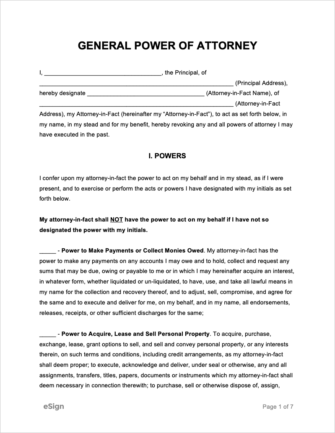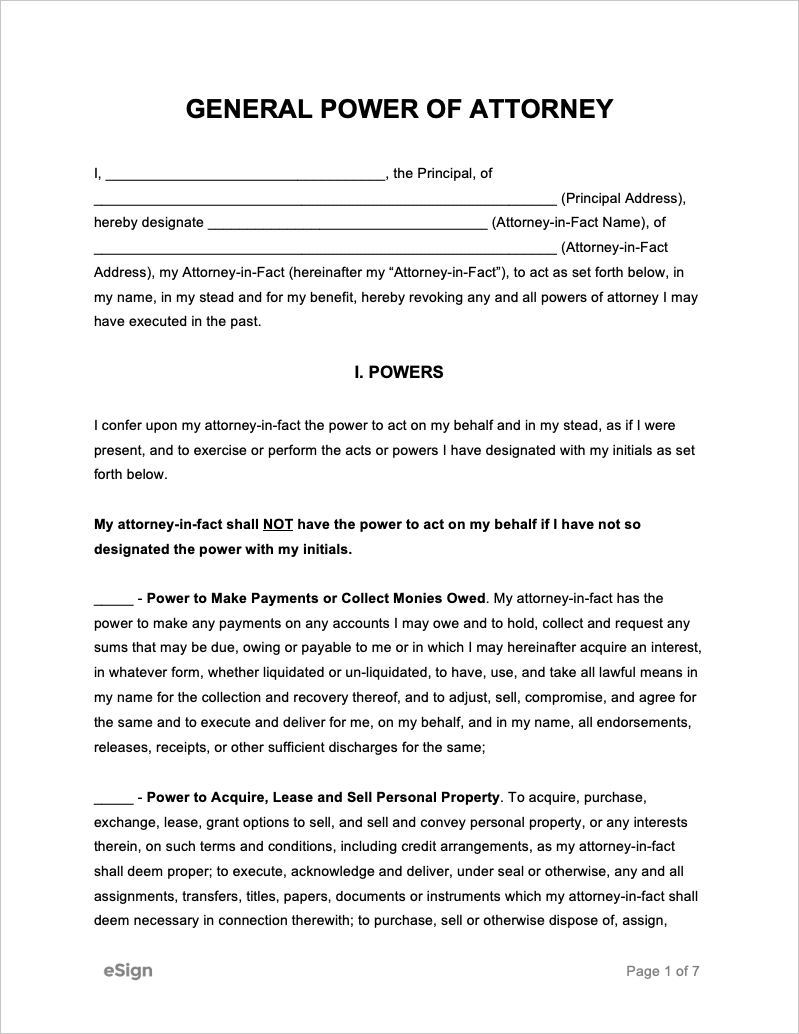Document Features
- Financial Powers – Clearly defines the powers the principal grants to their agent.
- Authority – Ensures that third parties can rely on the agent’s authority without liability.
- Termination – Establishes under what circumstances the power of attorney terminates.
- Acceptance – Indicates that the agent has accepted their appointment.
By State
- Alabama
- Alaska
- Arizona
- Arkansas
- California
- Colorado
- Connecticut
- Delaware
- Florida
- Georgia
- Hawaii
- Idaho
- Illinois
- Indiana
- Iowa
- Kansas
- Kentucky
- Louisiana
- Maine
- Maryland
- Massachusetts
- Michigan
- Minnesota
- Mississippi
- Missouri
- Montana
- Nebraska
- Nevada
- New Hampshire
- New Jersey
- New Mexico
- New York
- North Carolina
- North Dakota
- Ohio
- Oklahoma
- Oregon
- Pennsylvania
- Rhode Island
- South Carolina
- South Dakota
- Tennessee
- Texas
- Utah
- Vermont
- Virginia
- Washington
- West Virginia
- Wisconsin
- Wyoming
General Power of Attorney: Explained
A general power of attorney authorizes an agent to handle tasks related to the principal’s finances and property, but only while the principal has mental and physical capacity.
General powers of attorney are often granted when someone needs assistance managing their financial affairs during a vacation, hospital stay, or other temporary absence. It enables the agent to handle certain responsibilities until the principal can resume control.
General vs Durable Power of Attorney
While both forms grant general financial powers to the agent, there are a few distinct differences between a general and durable power of attorney:
General Power of Attorney
- Ends if the principal becomes incapacitated.
- Best suited for short-term or temporary needs.
- If the principal becomes incapacitated, a court order may be required to manage their finances.
Durable Power of Attorney
- Remains valid if the principal becomes incapacitated.
- Used for long-term planning and to prepare for potential future incapacity.
- Ensures the principal’s finances will continue to be managed even if they can no longer act.
How to Grant General Power of Attorney
Step 1 – Select an Agent
The principal must choose a trustworthy and competent agent. This individual will have executive control over their finances, and a poor choice can lead to mismanagement or even abuse of that authority.
Step 2 – Choose Powers
When filling out a general power of attorney form, the principal will need to specify each financial matter the agent is allowed to handle on their behalf. Common financial powers granted include:
- Buying and selling real estate
- Managing rental property
- Making bank deposits and withdrawals
- Paying bills and taxes
- Handling retirement and insurance benefits
Exclusions – The agent may only carry out the financial tasks explicitly authorized in the power of attorney form. Any powers not listed are automatically excluded.
Step 3 – Complete the Form
Although not required, the principal and agent should complete the power of attorney form together. Doing so helps ensure the agent understands their responsibilities and the principal’s expectations.
Step 4 – Sign the Power of Attorney
To be valid, the principal must sign a general power of attorney following the same requirements that apply to a durable power of attorney. Most states require notarization, while some also require signatures from two disinterested witnesses.
Sample
GENERAL POWER OF ATTORNEY
I, [PRINCIPAL NAME], the Principal (“Principal”), of [PRINCIPAL ADDRESS], hereby designate [ATTORNEY-IN-FACT NAME], of [ATTORNEY-IN-FACT ADDRESS] as my Attorney-in-Fact, to act as set forth below, in my name, in my stead and for my benefit, hereby revoking any and all powers of attorney I may have executed in the past.
1. POWERS. I confer upon my Attorney-in-Fact the power to act on my behalf and in my stead, as if I were present, and to exercise or perform the acts or powers I have designated with my initials as set forth below.
My Attorney-in-Fact shall NOT have the power to act on my behalf if I have not so designated the power with my initials.
[INITIALS] – Power to Make Payments or Collect Monies Owed
[INITIALS] – Power to Acquire, Lease, and Sell Personal Property
[INITIALS] – Power to Acquire, Lease, and Sell Real Property
[INITIALS] – Power to Manage Personal Property
[INITIALS] – Banking Powers
[INITIALS] – Motor Vehicle Transactions
[INITIALS] – Tax Powers
[INITIALS] – Gift Making Powers
[INITIALS] – Lending and Borrowing
[INITIALS] – Other: [DESCRIBE OTHER POWERS].
2. INTERPRETATION AND GOVERNING LAW. This instrument is a general, non-durable power of attorney. The specific powers listed do not limit the broader authority granted to my Attorney-In-Fact. Any interpretation to the contrary conflicts with my intent. Executed in the State of [STATE], this instrument is governed by its laws but is intended to have full effect in any state or country where I reside or own property. My Attorney-in-Fact shall not be required to post bond, and if one is required, no sureties shall be necessary. Copies of this document shall carry the same legal effect as the original.
3. EFFECTIVE DATE & TERMINATION. This document shall become effective: (initial one)
[INITIALS] – Upon the date of this document with my authorization.
[INITIALS] – The following date: [DATE].
This document shall terminate: (initial all that apply)
[INITIALS] – On the following date: [DATE].
[INITIALS] – When I have made a written revocation.
[INITIALS] – When and if I become incapacitated and unable to make decisions as determined by a physician.
4. THIRD PARTY RELIANCE. Any party may rely fully on my Attorney-in-Fact’s authority without questioning how proceeds are used or whether actions are properly authorized. Those who act in good faith on my Attorney-in-Fact’s representations shall not be held liable to me or my estate. I ratify all lawful acts done under this power. Any gift made under the specific authority granted in Section 1 shall constitute full and valid transfer of title to which third-party buyers may rely. My Attorney-in-Fact may pursue legal action as needed to ensure this instrument is given full force and effect.
IN WITNESS WHEREOF, I have executed this general non-durable power of attorney on [DATE].
Principal Signature: _____________________________
Print Name: [PRINCIPAL NAME]
ACCEPTANCE OF APPOINTMENT
I, [ATTORNEY-IN-FACT NAME], the Attorney-in-Fact named above, hereby accept appointment as attorney-in-fact in accordance with the foregoing instrument.
Attorney-in-Fact Signature: _____________________________
Print Name: [ATTORNEY-IN-FACT NAME]
WITNESS
We, the witnesses, each do hereby declare in the presence of the Principal that the Principal signed and executed this instrument in the presence of each of us, that the Principal signed it willingly, that each of us hereby signs this power of attorney as witness at the request of the Principal and in the Principal’s presence, and that, to the best of our knowledge, the Principal is eighteen years of age or over, of sound mind, and under no constraint or undue influence.
Witness Signature: _____________________________
Print Name: [WITNESS NAME] Address: [WITNESS ADDRESS]
Witness Signature: _____________________________
Print Name: [WITNESS NAME] Address: [WITNESS ADDRESS]
NOTARY ACKNOWLEDGMENT
STATE OF [NOTARY: STATE]
COUNTY OF [NOTARY: COUNTY]
On [DATE], before me appeared [PRINCIPAL NAME], as Principal of this power of attorney who proved to me through government issued photo identification to be the above-named person, in my presence executed foregoing instrument and acknowledged that he/she executed the same as his/her free act and deed.
Notary Signature: _____________________________
Print Name: [NOTARY NAME]
My Commission Expires: [DATE] (seal)





